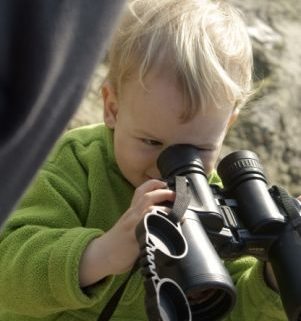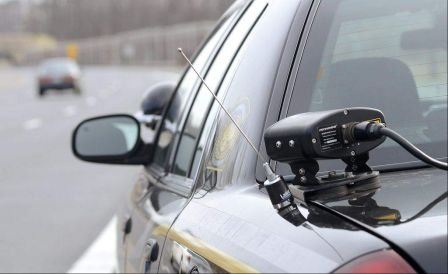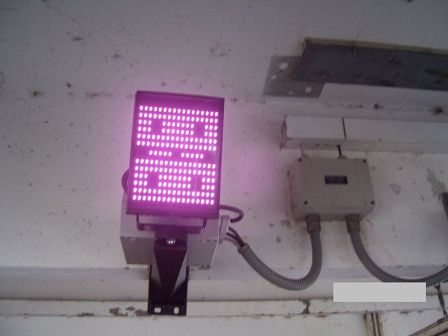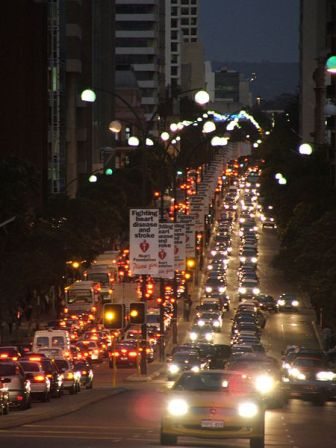You Are Being Watched: You Can’t Hide From Prying Eyes
What if I told you the government is watching, tracking and recording your every move, including your trips to the grocery store, the bank, to the free STD clinic, church, and the regular noon “meetings” at the Pay-By-The-Minute Hotel that, by the way, started the whole free clinic thing in the first place? Would it bother you that all your movements have been fed into a huge database that can be accessed by law enforcement any time they want—no warrants necessary?
You don’t do anything wrong, so why worry? Okay, let’s say, for example, you loan your prized 1985 Yugo to your neighbor for the day. The neighbor, unbeknownst to you, is a psycho serial rapist and killer and is not caught until thirty years later. Police tie him to 13 murders, one of which was committed the day he borrowed your car.
Well, as your luck would have it, the police have a record of your car parked in the driveway of murder victim #4. In a flash, the cops are at your door, waking up the wife and her folks who’re up from Tampa visiting for two weeks. Officer Cawtcha Redhanded loudly asks you, in front of the little woman and the in-laws, to explain why, thirty years prior, were you at the home of a Ms. Bleedeasy, a deceased call girl who was found murdered the day your car left an amoeba-shaped oil stain on the concrete. ‘Spain that one, bubba.
Could the above scenario happen. Sure it could, and here’s why.
Automatic license plate readers. They’re everywhere. On police cars. Mounted to sign posts. Attached to bridges. Bolted to parking garage walls. You name the place and law enforcement is trying to think of a way to get one there.
The devices take a photo of every single passing car, even if the vehicle is stationary, like the Yugo in Ms. Bleedeasy’s driveway. They also record every single license plate number, the time and date the information was recorded, and the precise location where the car was at the time the photo was taken. As a former Alaska politician would say…“Gotcha’.”
In the beginning, plate readers were a wonderful tool for law enforcement. They helped cops spot cars that had been involved in crimes (robberies, kidnappings, etc.), cars that had been stolen, and, well, you get the idea. The cool part of this technology is that officers receive a “hit” in real time on numbers they’ve manually entered into the reader. Best of all, the readers are capable of scanning every single car and truck, even during rush hour traffic!
Now, though, since the introduction of plate readers to law enforcement, all of this data collected on private citizens has poured into massive databases where much of it now sits. That’s right, your trips to the hardware store have probably been recorded and, that information is in limbo waiting for a police officer to call it up the next time Joes’ Nuts and Bolts is robbed. And, if the robbery occurred anywhere near the day and time you stopped by to pick up a roll of chicken wire, well, you can probably expect a call or visit from Officer Notso Friendly. That is, unless you live in Minnesota, where the state patrol only retains the information for 48 hours. In other locations, though, such as Yonkers, NY and Mesquite, Texas, they keep the data on file indefinitely. Raleigh, N.C. – 6 months. High Point, N.C. – 1 year (remember that WPA attendees).
Are the license plate readers effective in the effort to locate criminals? Well, according to one report, out of every 1 million plates read in Maryland, only 47 “hits” were associated with serious offenses (stolen cars and/or plates, a wanted person, a sex offender, etc). And, not all 47 hits resulted in an arrest.
License plate readers have also been used for non-law enforcement purposes too. Everybody and her “big brother” wants a piece of this spy action, including repo companies and parking enforcement officials
For example, a small city in the south purchased and installed a plate reader on a city vehicle. A worker now drives all over town, slowly passing through parking lots hoping to get a “hit” on vehicles registered to citizens who’re delinquent in paying local taxes, city court fees, water bills, and even dog licenses. If the city employee does receive a hit on a vehicle, he stops and places a boot on the car, and the locking device is not removed until the delinquent fees are paid.
With all of this in mind, now might be a good time to re-think your appointments for the day. Well, at least re-think how you’ll get to those appointments. After all, “they’re” watching.
You know, this article brings to mind an old Eagles tune whose title should be altered to You Can’t Hide From Prying Eyes…













Lee, great post. I just wanted to add that I used this technology while a in law enforcement. We had several agencies that had these cameras mounted to their lightbars and collected license plate information 24×7 as they were driving around on patrol. This system was integrated into their mobile data computers (MDCs) and it would give the officer an audible alert anytime the camera system detected a vehicle that was stolen or otherwise had a NCIC hit on it.
The police are dealing with some legal issues surrounding these devices as many states require that before an officer can submit an inquiry about your license plate, they must have a reasonable suspicion that you’ve violated some law. Since these devices cause hundreds of thousands of inquiries without any reasonable suspicion, some states are rewording their laws. It is also causing a strain on state and federal systems to query all of these requests, so some agencies are creating separate “hit lists” for license plates of stolen and wanted cars (to include missing persons, witnesses, etc.) that can be checked separate from their state DMV and NCIC systems.
The agencies in my area used an online company to aggregate their data for web-based searching. The link to the company is here: http://www.nvls-lpr.com/nvls/default.aspx The nice thing about this is that officers could search a plate or partial plate to see a photograph of where the car had been seen at and the date/time it had been seen. The worrisome part, especially from my background, is the cybersecurity aspect of this. How does this company and everyone else storing this data ensure it is safe and secure from hackers? With all this “law enforcement sensitive” data being stored in the cloud by third party private companies, it definitely creates some interesting dynamics.
Well, Jonathan, I believe NSA has access to Facebook, and all your other online activities. So my vote goes to NSA.
You know, my plan to move out of the suburbs to an urban environment where everything is accessible by foot or bicycle sounds better all the time…
10 or 12 years ago, there was talk about a National ID system in the US. Some speculation even went in the direction of implantable RFID chips, like you might do for a domestic pet. I followed a user discussion on an IT-related online forum. One gentleman reacted quite violently, saying “No way would I allow that for myself, my wife, my kids. Nobody is going to take that information from me!”
I used to be pretty good a ferreting out information in the pre-Google days, so I decided to do a bit of research. Using the search engines available at the time (Yahoo!, Alta Vista, and the new kid on the block, Google) I poked around for about 20 minutes. Though he posted under a pseudonym, at the end of 20 minutes, I knew his real name, his home address, his 2 previous addresses (in two different states), his wife’s given name, the number of kids (though not their names, I felt creepy digging in that area), the name of his previous 4 employers (he moved around) and the contract employer that had placed him in 3 previous assignments. Oh, and I had a satellite image of his red Dodge pickup truck parked next to the fishing boat in his driveway, at his unlisted address.
This was all publicly available information, correlated by information he had voluntarily made public.
I didn’t bother phoning his unlisted number to tell him, I thought it might freak him out a bit.
Anyone who uses credit cards, who uses any free Internet services (like email, social networking, …) has volunteered some amount of personal information in exchange for those services, and the companies that assemble and cross-reference that data are very good at what they do. And they aren’t the police.
So yeah, it’s disturbing that my license plate is being read everywhere it goes, but before jumping off that merry-go-round, look about and you’ll discover that it’s sitting on top of a larger one that’s turning faster.
The real question is, who knows more about us, the NSA, or Facebook?
Mary, the capability to do so is definitely there, and it happened to a group of school children. Someone in their school remotely activated the school-owned computer’s built-in cameras “supposedly” to learn the locations of the devices (I believe they were on a loaner program and were past due, or something of that nature). School officials were then able to see inside kids’ bedroom and other areas of the homes, without the kids knowing they were watching their every move. Now that’s creepy.
I found the news story.
http://www.computerworld.com/s/article/9158818/Pennsylvania_schools_spying_on_students_using_laptop_webcams_claims_lawsuit
I’ve been told that we can and are being watched in our homes through our computers. True or a conspiracy theory?
Ironic isn’t it? The Police (Sting) recorded the song: “Every Move you Make…I’ll be watching you.” Can you believe some people have it sung at their wedding.
Sure, auto plates, your car’s history, a zig-zag track of your life. A parallel technology, facial recognition, is quickly getting to the same degree of accuracy and ubiquity.
Then there’s: credit card use (in person and over the internets, what you’ve bought, from whom), browser history (on your computer & on your ISP’s servers, every website you’ve ever seen), phone records in general (meta data & content), cell phone tracking (with or without the calls), your Google autobiography (every question you’ve ever asked, public library books checked out. Data without end, amen.
Some of it’s gathered in pursuit of criminals, some of it for commercial purposes (targeted marketing), a lot of it just because they can, without yet having worked out a use for it. We’re born naked, now we all live naked, too.
Smile everybody.
Now, Lee, those drones do worry me because they can arrive at my home. I sure don’t need the Feds peeking in my bedroom windows. I think I need to shop online for black out shades or maybe those pulled down hurricane shutters that block out everything.
Not a chance, Patrick. And you’re right, most people either don’t give a rat’s patoot or they’ve never heard of these things or any other intrusive surveillance method used by law enforcement/government. They’ll wake up when they see the mechanical hummingbird/drone hovering outside their bedroom window…maybe.
https://leelofland.com/wordpress/planting-bugs-inside-bugs-now-thats-sneaky/
Sally, these devices can only be used in a proactive manner, catching crooks after crimes are committed, if then. The concern many people have is that after data on millions of people is collected, what then? After all, 98% of the data gathered and stored is that of innocent citizens, not bad guys.
Very interesting but I`m not sure if most people are concerned. By the way can I borrow your car next week, Lee? I have to go to Florida to pick up a “package” and take it up to Brooklyn. My car is in the shop.
What’s interesting is with all this survelliance (including records of all of our phone calls), mass killings and crime still happen. I guess all of this nosiness pays off only after the fact, not as a preventative measure.
Wow, knew they had these in the city, didn’t realize they could put in on a car.
I guess if I loaned my car out, wasn’t elderly and semi-handicapped, I might be worried. I don’t owe any back taxes or have any outstanding tickets. Last winter Hubby had to charge my car battery three times due to lack of use, so I guess I’m safe there.
The only places I go are the doctor’s, the bagel shop, the pharmacy, or my sisters. However, if that little blonde guy at the top of the blog wants to watch me, yeah for him. He’s adorable.
Where I could be in trouble is that OnStar thing. I mean, if they ever heard the conversations Hubby and I have during our dock lunches, watch out! We discuss murders, bank heists, weapons, and terrorist activities, etc. So I just might have to look out for Officer Notso Friendly. But, as for Officer Cawtcha Redhanded, unless he can listen in on a 2004 car or a 1994 truck, neither of which has OnStar, I guess I’m okay.
Thanks for posting the details, Lee. This is scary, really. Makes me want to stay home and not go anywhere.
Thanks for posting this one, Lee. Sick that this sort of thing barely gets online news posting, and gets ignored on the news that people actually pay some attention to (assuming there is such a thing anymore.)
I live waaay out in the middle of nowhere, drive to town maybe two days a week, go to boring places like the grocery store and the library. No GPS, no OnStar, nothing more exotic in my vehicle than a CD player. Haven’t had a ticket for anything in years, don’t owe taxes, nada…anybody listening in or watching what I do all day will be bored into a coma. You’d think that with all this supposed surveillance and “they” knowing what everybody’s doing every moment, the cops would be nabbing bad guys left and right but apparently, that isn’t happening. The nasties are still out there lurking under their rocks and doing their dirtiest. Sounds to me that some places are using license plate readers aimed more at raising revenue than stopping bad guys.
I bought a new car that had OnStar. I didn’t go through the activation procedure because I didn’t want it, couldn’t think of any way I could use it, and was tired of being watched over as if I was a preschooler. About two months after I bought the car, I was driving along talking to my wife when someone above me said, “Sorry to interrupt, but we are wondering why you haven’t activated OnStar. For a brief instant, I thought this might be the Rapture, but there wasn’t a trumpet blowing. After I realized it was someone from OnStar I assumed it was a recorded message, but it wasn’t. We could hear her and she could hear us. I hadn’t pushed the activation button, hadn’t passed Go, hadn’t collected my $200 dollars, nor had I got a “Get out of Jail Free” card. Someone was listening in on our conversation without authorization.
How long will it be until they can tune in on our conversations while we are in the privacy of our home through our television, our cell phone, or our toothbrush? I am a grown man, or at least old enough to be considered as such. I don’t need some nerd from a telemarketer firm checking in on me.
I had thought the information was a temporary storage. The idea that it’s just amassing someplace to follow my life from point a to point b is unnerving. Becoming a hermit sounds kind of attractive 🙂